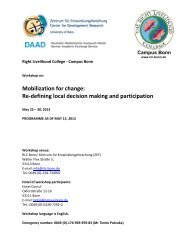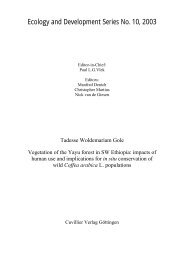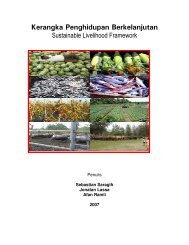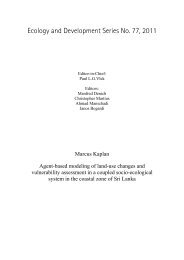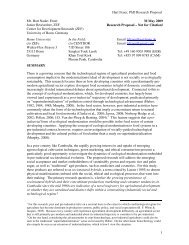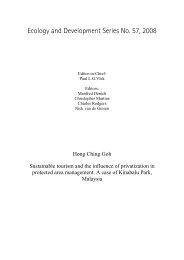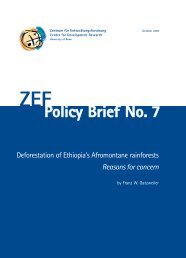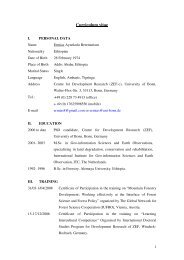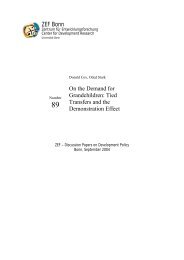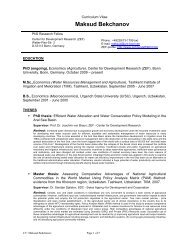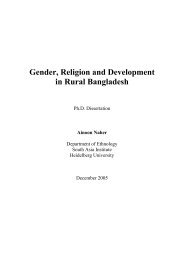ZEF Bonn
ZEF Bonn
ZEF Bonn
Create successful ePaper yourself
Turn your PDF publications into a flip-book with our unique Google optimized e-Paper software.
2.1.2 Schooling or work? The determinants of child labour in Africa<br />
Child labour of the exploitative type must be overcome fast. Economic and legal<br />
action is needed. Empirical evidence indicates that child labourers are found mostly<br />
in developing countries and are employed mainly in agriculture and related activities.<br />
In many developing countries, the contribution of children to family income<br />
has been found to play a consistently significant role. A <strong>ZEF</strong> study examined how<br />
subsistence-rural households decided to allow their children to spend time on competing<br />
activities, including work and school attendance. The results show that a<br />
number of child- and household-specific attributes, culture- and location-specific<br />
factors as well as economic factors related to household wealth and technological<br />
development affect the decision-making process. Improving the educational infrastructure,<br />
encouraging technological adoption and creating a more stable economic<br />
base for rural households could significantly contribute towards reducing the<br />
problem of child labour.<br />
2.1.3 Economics of volunteering - A cross-country investigation<br />
<strong>ZEF</strong> research draws attention to the key rules for development of institutions that<br />
operate in the sphere between state and market. The project “Volume and Economic<br />
Value of Volunteering in Countries of Different Income Levels" was launched in<br />
June 2000 as a joint initiative with the United Nations Volunteers. Bangladesh,<br />
Ghana, Poland and South Korea have been selected for theoretical and empirical<br />
research on the determinants of volunteering and the analysis of the economic significance<br />
of volunteer labour supply. A common methodology and survey design<br />
were employed in each country in order to enable cross-country comparisons. Initial<br />
results on the volume and economic value of volunteer work were obtained as a<br />
contribution to the 'International Year of the Volunteer 2001'. Findings revealed<br />
that the share of volunteers in the total population who are engaged in regular<br />
volunteer work within an institution of the Non-profit Sector increases with the<br />
level of economic development of the country, ranging between 0.43 % of the<br />
population in Bangladesh and 5.47 % in South Korea. The profile of volunteers also<br />
revealed considerable variations across the countries, reflecting, for example, that far<br />
fewer women compared to men are engaged in volunteer work in Bangladesh and<br />
Ghana. In contrast, female volunteers outweigh their male counterparts in Poland<br />
and South Korea. Volunteers in Bangladesh and Ghana also showed a higher frequency<br />
of volunteering, with many of them involved daily.<br />
2.2 Trade and Macroeconomic Issues of<br />
Development<br />
Trade liberalisation and macroeconomic reforms confront<br />
developing countries with new challenges. To support<br />
these countries in meeting the challenges, <strong>ZEF</strong>'s research<br />
concentrates on the impact of Foreign Direct Investment<br />
(FDI) policies and international trade and aid on the<br />
development of low-income countries, and on mechanisms<br />
of global governance, including social and environmental<br />
standards. Three research areas have been<br />
selected and will be presented in the following.<br />
Working children at<br />
a market in Ghana<br />
Research<br />
<strong>ZEF</strong> research shows that the<br />
profile of volunteers varies<br />
considerably across countries.<br />
For instance, far fewer women<br />
compared to men are engaged<br />
in volunteer work in<br />
Bangladesh and Ghana, while<br />
female volunteers outweigh<br />
their male counterparts in<br />
Poland and South Korea.<br />
49



